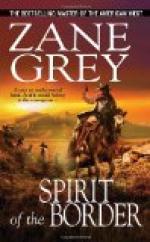Wingenund strode with thoughtful mien before his council. He had heard all his wise chiefs and his fiery warriors. Supreme was his power. Freedom or death for the captives awaited the wave of his hand. His impassive face gave not the slightest inkling of what to expect. Therefore the prisoners were forced to stand there with throbbing hearts while the chieftain waited the customary dignified interval before addressing the council.
“Wingenund has heard the Delaware wise men and warriors. The white Indian opens not his lips; his silence broods evil for the palefaces. Pipe wants the blood of the white men; the Shawnee chief demands the stake. Wingenund says free the white father who harms no Indian. Wingenund hears no evil in the music of his voice. The white father’s brother should die. Kill the companion of Deathwind!”
A plaintive murmur, remarkable when coming from an assembly of stern-browed chiefs, ran round the circle at the mention of the dread appellation.
“The white father is free,” continued Wingenund. “Let one of my runners conduct him to the Village of Peace.”
A brave entered and touched Jim on the shoulder.
Jim shook his head and pointed to Joe. The runner touched Joe.
“No, no. I am not the missionary,” cried Joe, staring aghast at his brother. “Jim, have you lost your senses?”
Jim sadly shook his head, and turning to Wingenund made known in a broken Indian dialect that his brother was the missionary, and would sacrifice himself, taking this opportunity to practice the Christianity he had taught.
“The white father is brave, but he is known,” broke in Wingenund’s deep voice, while he pointed to the door of the lodge. “Let him go back to his Christian Indians.”
The Indian runner cut Joe’s bonds, and once more attempted to lead him from the lodge. Rage and misery shown in the lad’s face. He pushed the runner aside. He exhausted himself trying to explain, to think of Indian words enough to show he was not the missionary. He even implored Girty to speak for him. When the renegade sat there stolidly silent Joe’s rage burst out.
“Curse you all for a lot of ignorant redskins. I am not a missionary. I am Deathwind’s friend. I killed a Delaware. I was the companion of Le Vent de la Mort!”
Joe’s passionate vehemence, and the truth that spoke from his flashing eyes compelled the respect, if not the absolute belief of the Indians. The savages slowly shook their heads. They beheld the spectacle of two brothers, one a friend, the other an enemy of all Indians, each willing to go to the stake, to suffer an awful agony, for love of the other. Chivalrous deeds always stir an Indian’s heart. It was like a redman to die for his brother. The indifference, the contempt for death, won their admiration.
“Let the white father stand forth,” sternly called Wingenund.
A hundred somber eyes turned on the prisoners. Except that one wore a buckskin coat, the other a linsey one, there was no difference. The strong figures were the same, the white faces alike, the stern resolve in the gray eyes identical—they were twin brothers.




